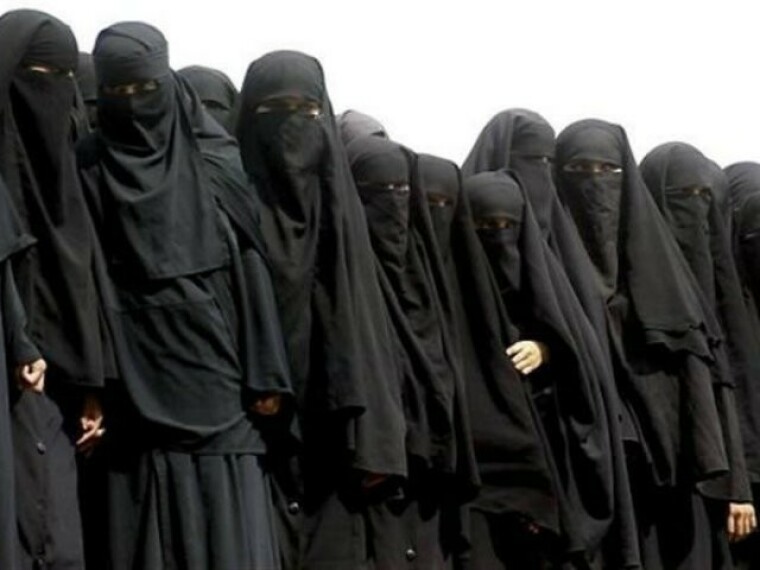Congo Bans Full-Face Islamic Veil, Seeing it as Tool for Terrorists to Conceal their Identity

Terrorists can no longer hide under a full-face Islamic veil in the Congo Republic after the Central African imposed a ban on the wearing of the veil in public as part of security measures to prevent terrorism.
Djibril Abdoulaye Bopaka, head of Congo's Islamic Council, said the nation's Islamic community, which he said is comprised of some 800,000 people, has agreed to the rule amid reports that individuals are using the veil to carry out illegal acts.
"The government took this step based on what was happening in the neighboring countries and the rest of the world," Bopaka said. "We regard this as a legitimate step for the security of the country."
"Together with authorities, we recognized that there were non-Muslims and badly intentioned people making use of the veil to carry out unauthorized acts," he told Radio France International.
The Congo government told Bopaka about the veil ban last April 23. He asked for a two-week delay on the implementation of the veil ban for him to disseminate the information to the nation's Muslim community.
Under the rule, women can wear the full-face veil in their homes or in mosques but not in public places including markets.
Not covered by the ban are veils that do not cover the face.
Many of the Muslim populace in the Central African country come from West Africa or Arab nations, Reuters reported. Less than 10 percent of Congo's 5 million citizens are Muslim.
Thousands of refugees have fled to Congo from neighboring Cameroon after attacks were committed by the Islamic militant group Boko Haram.
Last month, Boko Haram militants killed at least 10 people in two villages in Cameroon, according to Reuters.
"There were consecutive attacks by Boko Haram in Bia and Blaberi in the district of Kolofata in the early morning," said one Cameroon officer.
Boko Haram has killed thousands with the intent of establishing an Islamic state in Nigeria. Its fighters have also attacked neighboring countries in the hope of widening its influence in Africa.
 Christians don't have to affirm transgenderism, but they can’t express that view at work: tribunal
Christians don't have to affirm transgenderism, but they can’t express that view at work: tribunal Archaeology discovery: Medieval Christian prayer beads found on Holy Island
Archaeology discovery: Medieval Christian prayer beads found on Holy Island Presbyterian Church in America votes to leave National Association of Evangelicals
Presbyterian Church in America votes to leave National Association of Evangelicals Over 50 killed in 'vile and satanic' attack at Nigerian church on Pentecost Sunday
Over 50 killed in 'vile and satanic' attack at Nigerian church on Pentecost Sunday Ukrainian Orthodox Church severs ties with Moscow over Patriarch Kirill's support for Putin's war
Ukrainian Orthodox Church severs ties with Moscow over Patriarch Kirill's support for Putin's war Islamic State kills 20 Nigerian Christians as revenge for US airstrike
Islamic State kills 20 Nigerian Christians as revenge for US airstrike Man who served 33 years in prison for murder leads inmates to Christ
Man who served 33 years in prison for murder leads inmates to Christ


 Nigerian student beaten to death, body burned over ‘blasphemous’ WhatsApp message
Nigerian student beaten to death, body burned over ‘blasphemous’ WhatsApp message 'A new low': World reacts after Hong Kong arrests 90-year-old Cardinal Joseph Zen
'A new low': World reacts after Hong Kong arrests 90-year-old Cardinal Joseph Zen Iran sentences Christian man to 10 years in prison for hosting house church worship gathering
Iran sentences Christian man to 10 years in prison for hosting house church worship gathering French Guyana: Pastor shot dead, church set on fire after meeting delegation of Evangelicals
French Guyana: Pastor shot dead, church set on fire after meeting delegation of Evangelicals ‘Talking Jesus’ report finds only 6% of UK adults identify as practicing Christians
‘Talking Jesus’ report finds only 6% of UK adults identify as practicing Christians Mission Eurasia ministry center blown up in Ukraine, hundreds of Bibles destroyed: 'God will provide'
Mission Eurasia ministry center blown up in Ukraine, hundreds of Bibles destroyed: 'God will provide' Church holds service for first time after ISIS desecrated it 8 years ago
Church holds service for first time after ISIS desecrated it 8 years ago Burger King apologizes for 'offensive campaign' using Jesus' words at the Last Supper
Burger King apologizes for 'offensive campaign' using Jesus' words at the Last Supper Uganda: Muslims abduct teacher, burn him inside mosque for praying in Christ’s name
Uganda: Muslims abduct teacher, burn him inside mosque for praying in Christ’s name